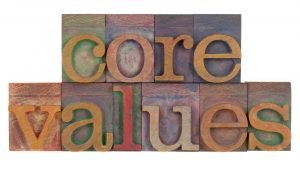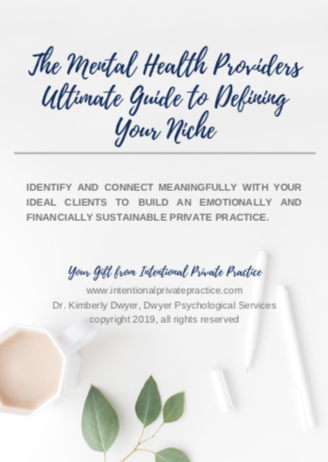As a psychologist or therapist, you probably spend a lot of time helping others to learn about themselves. But, along the way, you’ve inevitably gained a little knowledge about yourself as well. Here are my top take-aways that I’ve learned about myself after over a decade in private practice and two decades working as a doctoral level psychologist. I’m hoping some of these resonate with you and help you view your practice–and yourself–just a little bit differently.
It’s Ok to Want More. There, I said it. As providers, we are helpers by nature. We give a lot of ourselves and we do that for the benefit of others. Those “others” are often underserved, marginalized individuals. No matter where you work now, you probably cut your teeth working with underserved folks. For me, it was working with adults with developmental disabilities in a supported work program, and working in community mental health and state hospital settings all through grad school. We may have been told subtly, or more blatantly, that This Was The Work, and that any other work (ie, private practice) was lesser and selfish. I can remember conversations with supervisors that essentially equated leaving public service work for private practice as akin to making a deal with the devil.
Here’s the scoop: you can serve who you want to serve, and that may change over the course of your career and your lifetime. And that’s Ok. Repeat, a-ok. You get to choose who you work with, and I get to choose who I work with. And if you are at a point in your career where private pay private practice makes the most sense for you and your values, you get my stamp of acceptance (though, truly, you don’t need mine… you only need your own).
Your Business May be Fulfilling… but it Doesn’t Have to Check Every Box. In the world of a social-media curated narration of our lives and careers, social comparison is even more prevalent. It’s easy to fall into the trap of comparing our fulfillment from work to that of others (or to that of what others present to the world). You may be familiar with the concept of the Ikigai–roughly translated from Japanese as “reason for being”– and it’s related Venn diagrams. Essentially, this suggests that we find our true purpose when what we are paid for, what we love to do, what we are good at, and what the world needs overlap. Well, let me tell you, if you find that, that’s great and I for one am ecstatic for you. But I also want to tell you, if you don’t find that, or you haven’t found it yet, that’s ok, too, and you’re not broken. At different points in our lives our careers fill different spots that are unique to our needs.
My very first job after grad school was not an ideal fit for me. In fact, I was frequently miserable and often sobbed on my couch after work (not an exaggeration). I looked for other jobs half-heartedly, and put in my time towards licensure. And some interesting things happened. I became pregnant with my oldest and had the flexibility and tenure to dictate my demands: that I wanted to work part time. In a family friendly workplace, this was granted with no questions asked. My “purpose” moved from a fulfilling career that checked all the boxes to a workplace that allowed me to maximize my time with my baby. When I made that internal shift to seeing that my goal might be temporary and might not be the same goal as my colleagues, that made all the difference. Fast forward about 15 years and I can tell you that I learned so many things from that job that have served me exceedingly well through my career. I didn’t have the wisdom to know what they were at the time, but I do know that not feeling perfect alignment with all aspects of my work for a few years turned out ok.
I am the Expert on Me and on my Business. This is really a bigger life lesson–as I truly believe that each of us is the expert on ourselves at all times. That means advocating for yourself and listening to that quiet inner voice that will help you understand what is right for you, right now. But as this relates to your business, I have learned that I am the expert on my business, and, by extension, you are the expert on your business.
When I say this, it never fails to ruffle some feathers in the listening audience, so please keep reading. This DOES NOT mean that I know All. The. Things. But it does mean that I am the expert on knowing what is right for me. I am the expert on my value system, and you are the expert on your value system. When we align our business practices and policies with our value system, things suddenly become fresh and shiny and lovely. But when we adopt someone else’s business model without a clear understanding of the “why” behind what we are doing, it often does not end well.
Being an expert on me and my business also means I am finally attuned to the inner warnings that tell me I don’t know all the answers, helping me reach out and connect with the people who do have those answers. That might mean consulting with a colleague on a clinical issue, getting some clarity on business matters from other trusted professionals like my accountant, or getting some clarity on my own goals through coaching. But listening to my inner voice and knowing what is right for me allows me to discern when to reach out for support versus plowing ahead on my own (pro tip: plowing is generally not a good business strategy for the sensitive work we therapists do).
Narrowing My Niche Brought More Clients. Totally counterintuitive, right? But once I defined who I really love to serve and communicated that–passionately, because it’s something I’m passionate about!–my caseload increased. And not only did it increase, but it increased with the types of clients that are perfectly suited to work with me. That translates into happy clients who make good gains in therapy and go out into the world spreading positive word of mouth, which translates into future referrals. It also translates into developing a reputation as an expert in the area about which you are passionate about serving–which is warranted because you probably ARE an expert in that area.
I can actually trace a huge portion of my clientele to one therapy case at the start of my career that was a perfect fit for my niche. Word of mouth from that happy client then spread to other connections of theirs–through friends, employers, schools, and other therapists–which led to more clients, and more connections, all because this client was perfectly suited to me and I could articulate exactly why I was a great fit to help. Not sure where to start with this? I’d love for you to download my free Defining Your Niche guide, which will help you with this very important step to identifying your ideal clients and marketing your services. You can find it here.
I am Happiest When I Honor My Values. That icky feeling you get when things don’t sit right? That resentment that builds up when you bend a policy to accommodate someone or wiggle your boundaries to serve others without serving yourself? I’ve learned over time that this is my core self speaking up–you might think of it as your intuition, your soul, your inner wisdom, or in other terms. When I don’t listen and don’t honor this, I feel, for lack of a technical term, pretty yucky. If I don’t push away the yuck feelings but tune into them and turn towards them, I often learn something important about my work, and about myself. When I can align my actions with those values, things go much more smoothly and I am happier.
Here’s an example. I work with a lot of children and teens. I also have children and teens of my own–3 in fact. Over the years, as all children do, mine have grown. Their needs from me have been different: a transition from needing me to feed, cook, and entertain them, to a need for a safe spot to land, someone to help problem solve and manage the social minefield of the teenage years, and someone who is just present. In many ways, my presence is more needed at home now than it was when they were little, when it was easy to pay someone to give them an after school snack and encourage homework completion.
As this transition occurred for my children, I started to feel not so great about the work I was doing with kids in my practice. It wasn’t the clients or the therapy work, but it was the requirement that I be away from my family before my children go off to college. With at least 50% of my practice being kids and teens, making the call to not see children after school hours was not easy for me to do, but the resentment and “general yuck” building inside of me made it very clear that I needed to do so. I set this new boundary, communicated it clearly to new clients, and managed to transition and “grandfather” old clients into my new schedule. It did take some time to transition, but currently after school work is a rare exception on my schedule. I’m happy, I’m showing up 100% for my clients because I am not resentful, and I’m able to honor my need to care for my own family during this (passing) phase of life. Have some people chosen not to work with me because of this? Of course. But that’s ok, because right now, those folks are not a good fit for me at this point in my career. I can still serve them by helping them find another therapist that might be a better fit, and because I’m super clear on my values around this, I don’t feel bad, I don’t try to smush them in at a time that doesn’t work great for either of us, and I really don’t worry too much about it.
And finally: I Can Do Hard Things. I have learned so much about myself over my career as a psychologist. I can do hard things–that doesn’t mean I love to do them, but I can do them. I can provide difficult feedback to families after an assessment in a kind, empathic, supportive, and strengths-focused manner. I can make the difficult decision to refer out long term clients when I feel someone else will better meet their needs based on changing presentations. I can have difficult conversations and set boundaries around my work with co-workers and clients. I can seek out support from colleagues and trusted professionals to make some of the hard things less hard, and do more of the things I am uniquely suited to do. I can pay off exorbitant student loans that literally gave me panic attacks while I was in grad school. And I can make a very decent living, doing what I love to do, in a way that is emotionally sustainable for me as a person and honors my values.
And guess what, friend? You can do it, too. The guidance you need is already inside of you, waiting to be called forth. Need some support to reconnect with that voice? I love guiding private practice builders to launch, grow, and redefine their practices using values-aligned intentions. Reach out and let’s chat. Or get some community support through my closed facebook group. You’ve totally got this.




